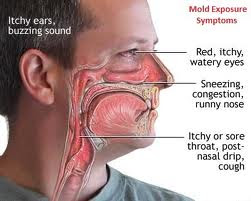Molds (also spelled "moulds") are ubiquitous in the biosphere, and mold spores are a common component of household and workplace dust. The United States Centers for Disease Control and Prevention reported in its June 2006 report, 'Mold Prevention Strategies and Possible Health Effects in the Aftermath of Hurricanes and Major Floods,' that "excessive exposure to mold-contaminated materials can cause adverse health effects in susceptible persons regardless of the type of mold or the extent of contamination." When mold spores are present in abnormally high quantities, they can present especially hazardous health risks to humans, including allergic reactions or poisoning by mycotoxins, or causing fungal infection (mycosis).
Health problems associated with high levels of airborne mold spores include [unreliable medical source?] allergic reactions, asthma episodes, irritations of the eye, nose and throat, sinus congestion, and other respiratory problems, although it should be noted that mold spores won't actually cause asthma, just irritate existing conditions. For example, residents of homes with mold are at an elevated risk for both respiratory infections and bronchitis. When mold spores are inhaled by an immunocompromised individual, some mold spores may begin to grow on living tissue, attaching to cells along the respiratory tract and causing further problems. Generally, when this occurs, the illness is an epiphenomenon and not the primary pathology. Also, mold may produce mycotoxins, either before or after exposure to humans, potentially causing toxicity.
Want more? Check out Certified Mold Inspection


No comments:
Post a Comment